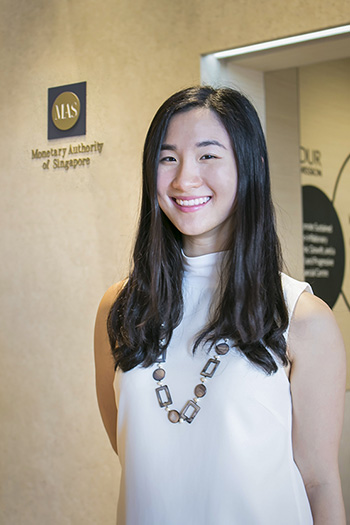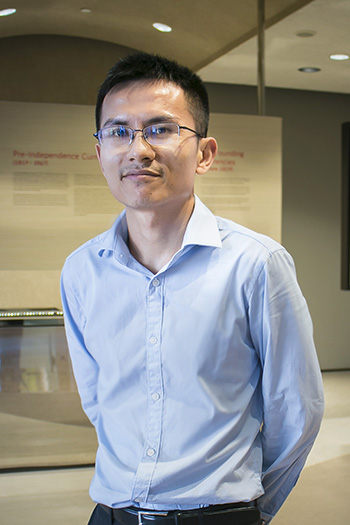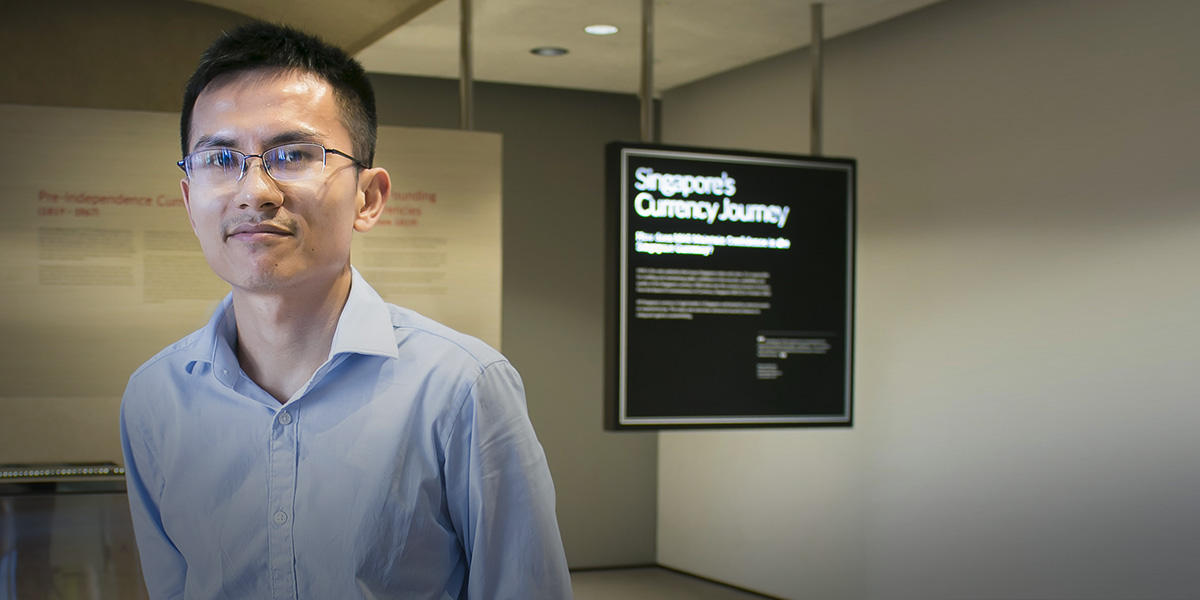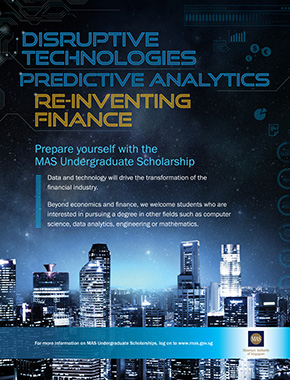Sustaining a strong and stable economic growth is the backbone of any modern nation’s success and progress. This great responsibility is managed by the Monetary Authority of Singapore (MAS), which ensures that our economy remains dynamic, competitive, and progressive as Singapore continues to thrive as a sound and progressive financial centre in the digital age.
Besides being invested in the growth of Singapore, MAS is equally invested in developing staff to grow professionally and pursue fulfilling careers. Harry Lee, Deputy Director in the Monetary & Domestic Markets Management Department, and Nico Teo, Associate in the Financial Center Development Department, talk about the current financial climate and how their roles serve to achieve the organisation’s objectives.
What are your main roles and responsibilities?
Nico: I help to grow and develop Singapore’s financial sector. This involves analysing global trends and evaluating regulatory developments that could impact the banking industry and Singapore’s competitiveness as a financial centre. We formulate business strategies to grow the banking ecosystem in Singapore, especially in today’s digital economy where innovation, digital transformation and change management are key tenets of firms’ ability to stay relevant and successful. The aim is for Singapore to be the leading global financial centre in Asia, where we can connect global markets, support Asia’s development and serve Singapore’s economy. For me, I help facilitate the growth plans of foreign banks in Singapore, and my role involves engaging key stakeholders to anchor and expand their businesses in Singapore, and create higher value-added roles for the economy.
Harry: I implement Singapore’s exchange-rate-based monetary policy, and manage banking system liquidity conditions. I analyse domestic financial markets and monitor global and regional financial market developments as well.

Nico Teo
MAS Undergraduate Scholarship
Associate, Financial Centre
Development Department
Bachelor of Science (Social Anthropology)
London School of Economics
Master of East Asian Studies
Yale University
That sounds very interesting. What are some challenges you face in these diverse roles?
Nico: Because the financial sector is so dynamic, keeping up with current trends and developments globally and locally is absolutely essential. It is pertinent to look at second-order effects as well e.g. how global issues like tax cuts in the USA, or Brexit, can affect our status as a financial hub, and if there are implications for our banks here in Singapore. Being adaptive, open-minded and having an appetite to learn are key to staying on top of our game.
Harry: My job involves dealing with wide-ranging issues. It keeps me on my toes when I interact with others from diverse backgrounds, and approach issues with varied perspectives. We need to be open to different opinions and find win-win solutions. I need to communicate effectively when I share my views in order to achieve an optimal outcome.
Excelling in your job sounds like a passionate goal for the both of you. How has the overseas exposure in your scholarships carved an edge for you to accomplish this?
Nico: Overseas exposure definitely helped to broaden my horizons - I got a deeper appreciation of a range of global issues/ trends. On tech and transformation for instance, my 12-week summer programme at Stanford (part of an entrepreneurship accelerator programme) gave me the opportunity to craft problem statements, utilise design-thinking and apply realworld solutions. I also got a chance to visit companies in the Valley like Google and Facebook which was definitely an enriching and eye-opening experience! The following summer, I interned at a U.S. investment bank in London which exposed me to the hustle and bustle of a trading floor, and I learnt a lot of valuable knowledge on global markets and financial products. These varied experiences and valuable perspectives helped me immensely in my work when synthesising different opinions and balancing different stakeholders and interests. This helps me to adopt a more robust outlook and devise strategies to further develop Singapore as a financial centre.
Harry: We need to work with a diverse range of people, whose values and opinions may differ from our own, and achieve common, actionable consensus. Having lived overseas as a student, and met people from a wide variety of backgrounds, I am more sensitised to the little things that others may overlook or take for granted. I listen carefully before speaking and am more conscious about what I am speaking about.

Harry Lee
MAS Undergraduate Scholarship
Deputy Director,
Monetary & Domestic Markets
Management Department
Bachelor of Science
(Biomedical Engineering)
Duke University
Master of Arts (Economics)
Duke Graduate School
Both of you mentioned a lot about the dynamics of teamwork in your departments. Give us an insight into the culture at MAS.
Nico: MAS is a place where people come from different walks of life, diverse backgrounds, and qualifications. It is a very collegial and supportive environment where seniors are very willing to share and teach, and even as a junior person, I am encouraged to share my opinions during meetings.
Harry: As one of the statutory boards with the widest range of functions, MAS consists of people with very different backgrounds. We have former financial advisors, entrepreneurs, soldiers, academics, and even a bartender! This creates a truly lively working environment.
Sounds like both of you truly enjoy the corporate environment you work in. As you continue with MAS, elaborate on the career aspirations you hope to achieve in the coming years then.
Nico: There are both managerial and specialist routes available at MAS. The best part about career progression at MAS is that you get a lot of autonomy in deciding where or how you want to explore your potential within the organisation. At present, I am looking forward to constantly learning different things and being exposed to different areas within a wider development track – whilst fulfilling various roles and responsibilities. It helps that MAS has been extremely supportive when it comes to developing skillsets needed for your job.
Harry: I have conducted in-depth research on the economy and financial systems, sharpened my understanding of financial markets and products, worked with foreign counterparts on global issues, and interacted with like-minded colleagues from other central banks. I look forward to continuously building on this set of experiences. At the same time, MAS is a dynamic organisation, and under leaders with amazing foresight, we have evolved to meet the requirements of a rapidly changing environment. I am excited about developing new skills and broadening my knowledge as I continue to grow with the organisation.
As parting words, share a few things scholars can look forward to if they join you at MAS.
Nico: You get to wear different hats, work on complex real-world issues and be constantly challenged on the way you think and analyse issues. We also have an in-house MAS Academy that provides courses, functional training, interpersonal and negotiation skills, creative design thinking, and much more, so you have the avenue to continuously develop yourself in MAS. It is an ever-learning journey!
Harry: MAS is a hub of opportunities so take advantage of that. Future scholars can expect supportive colleagues and nurturing bosses to help you grow as an individual both professionally and personally, and the chance to make meaningful contributions to society.

